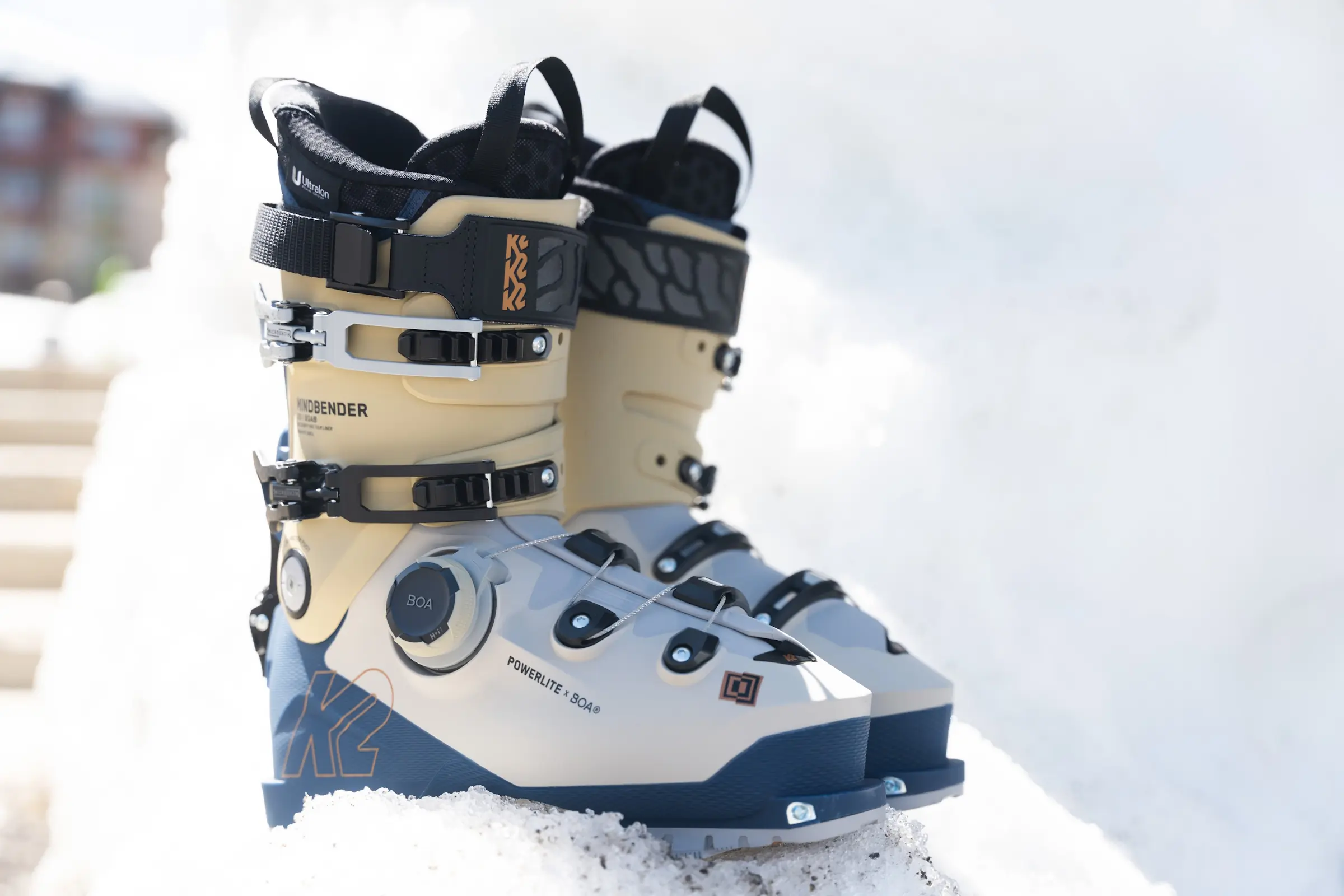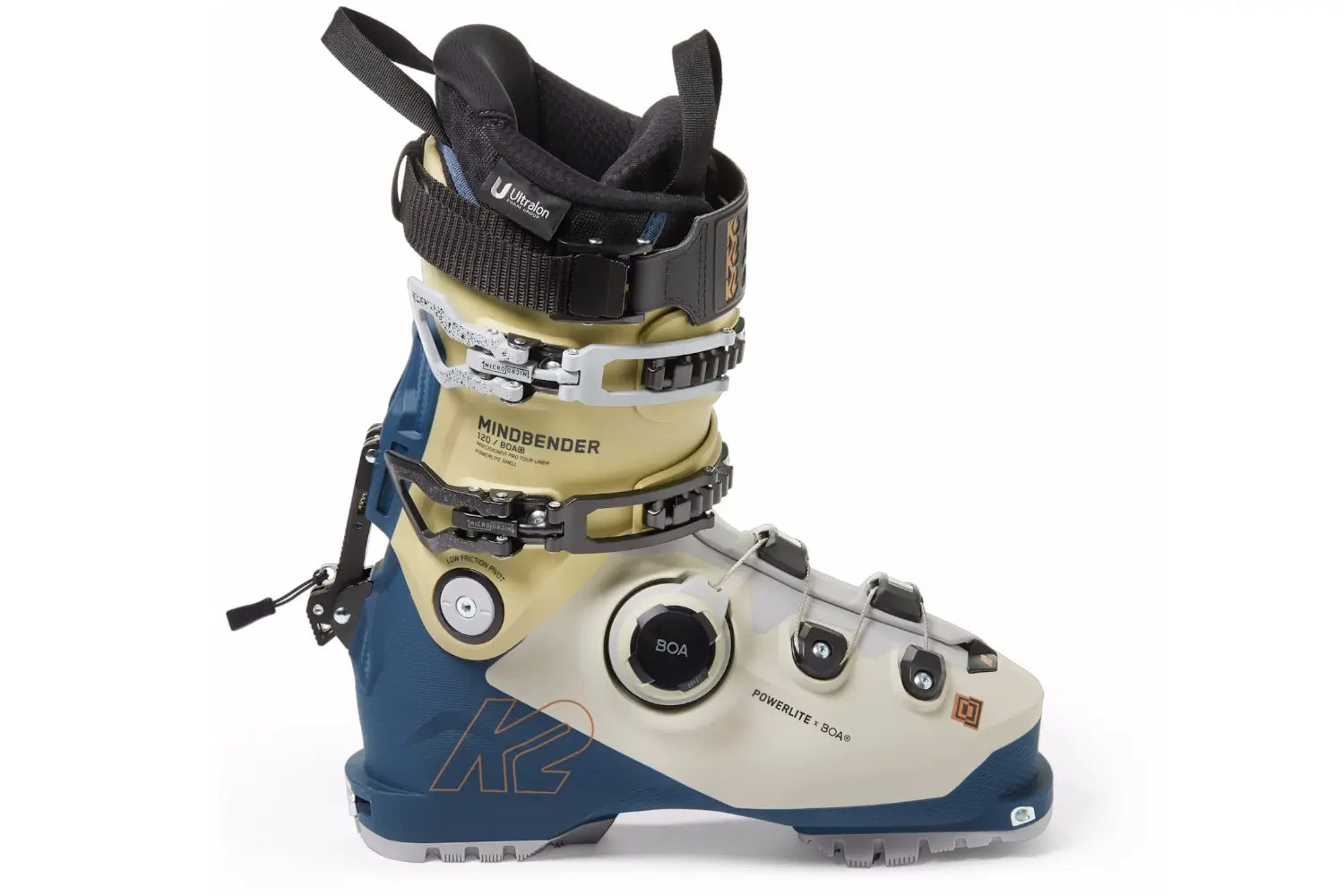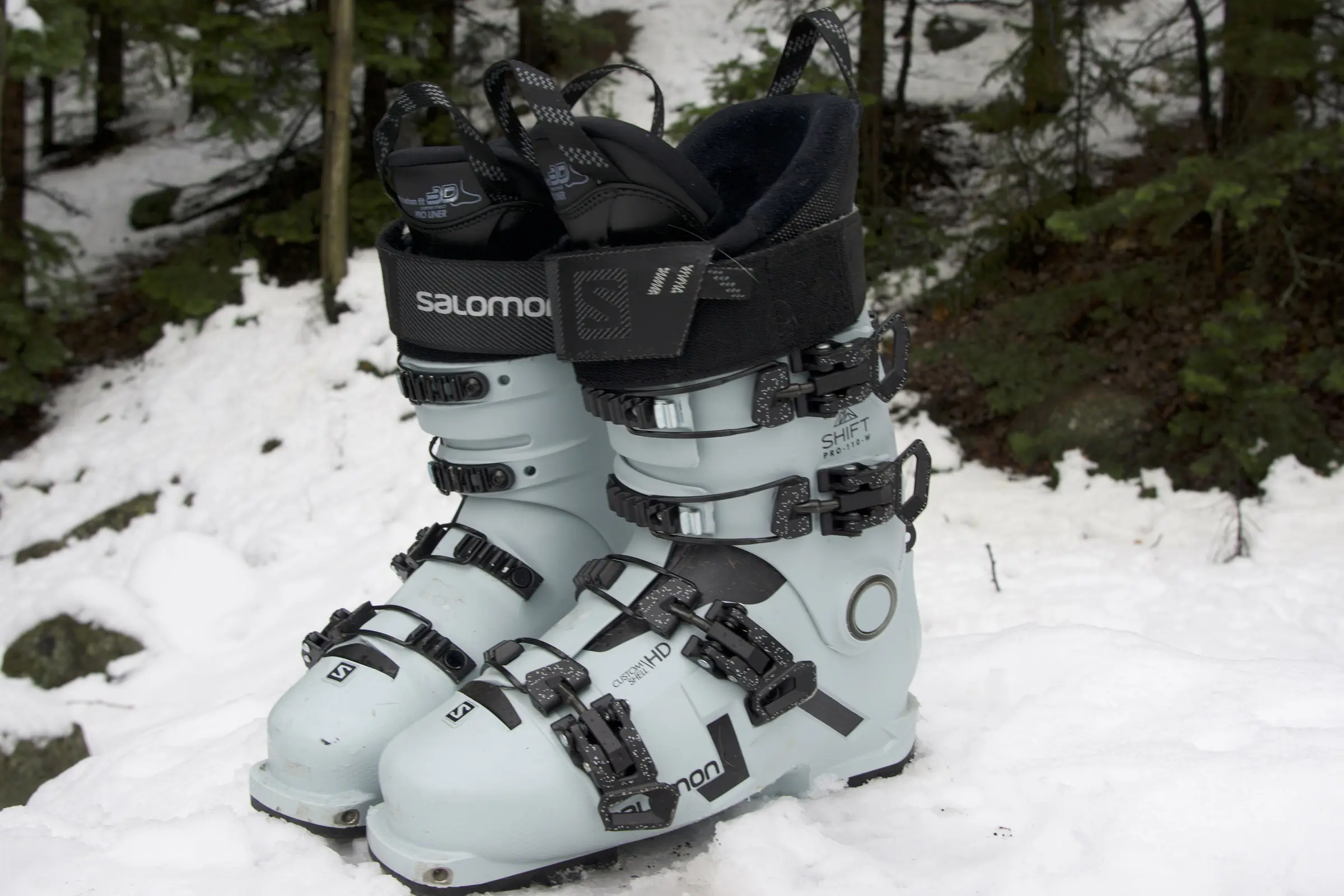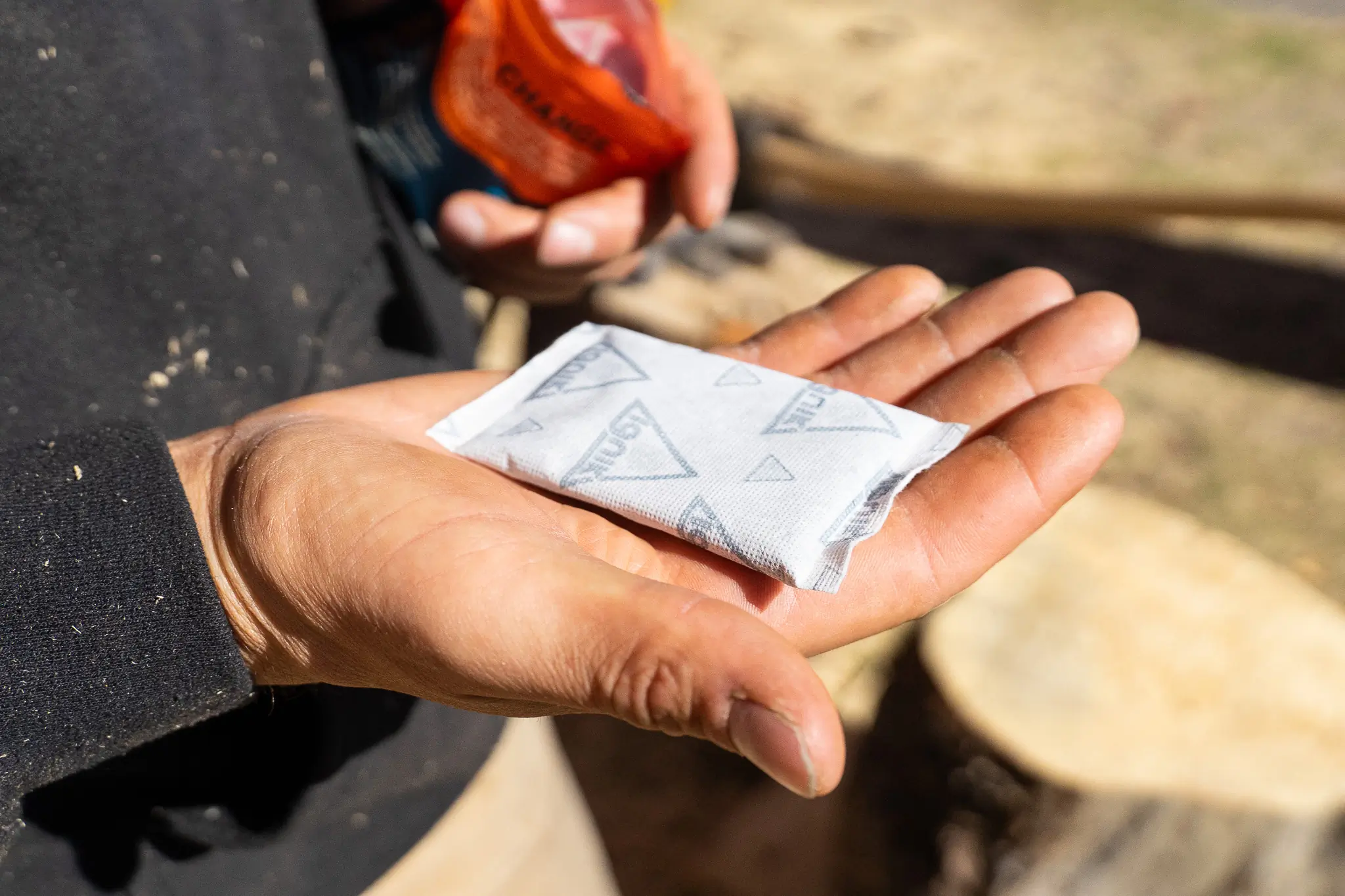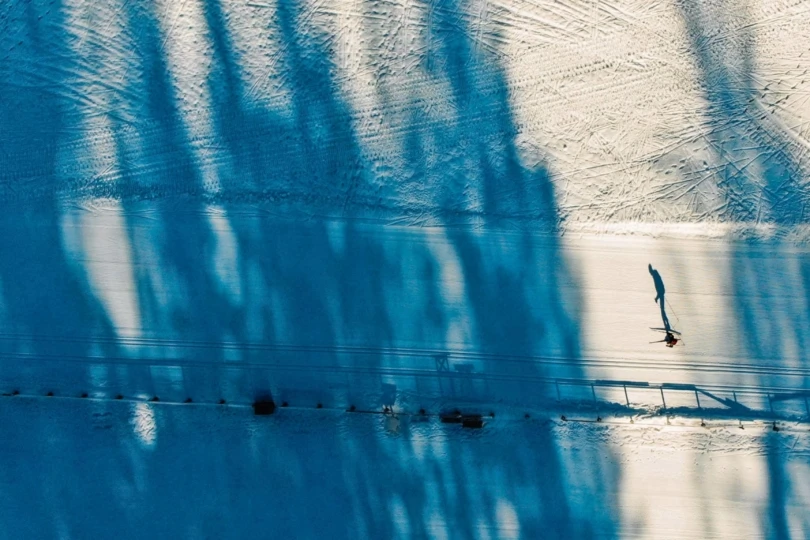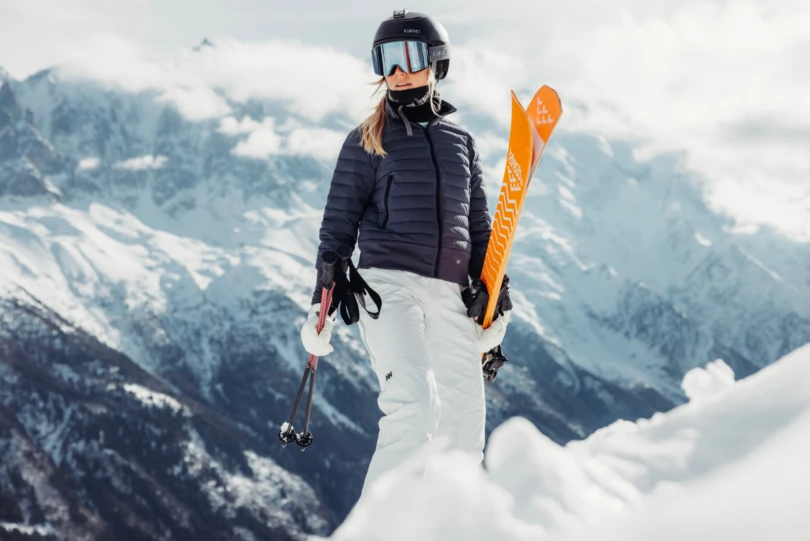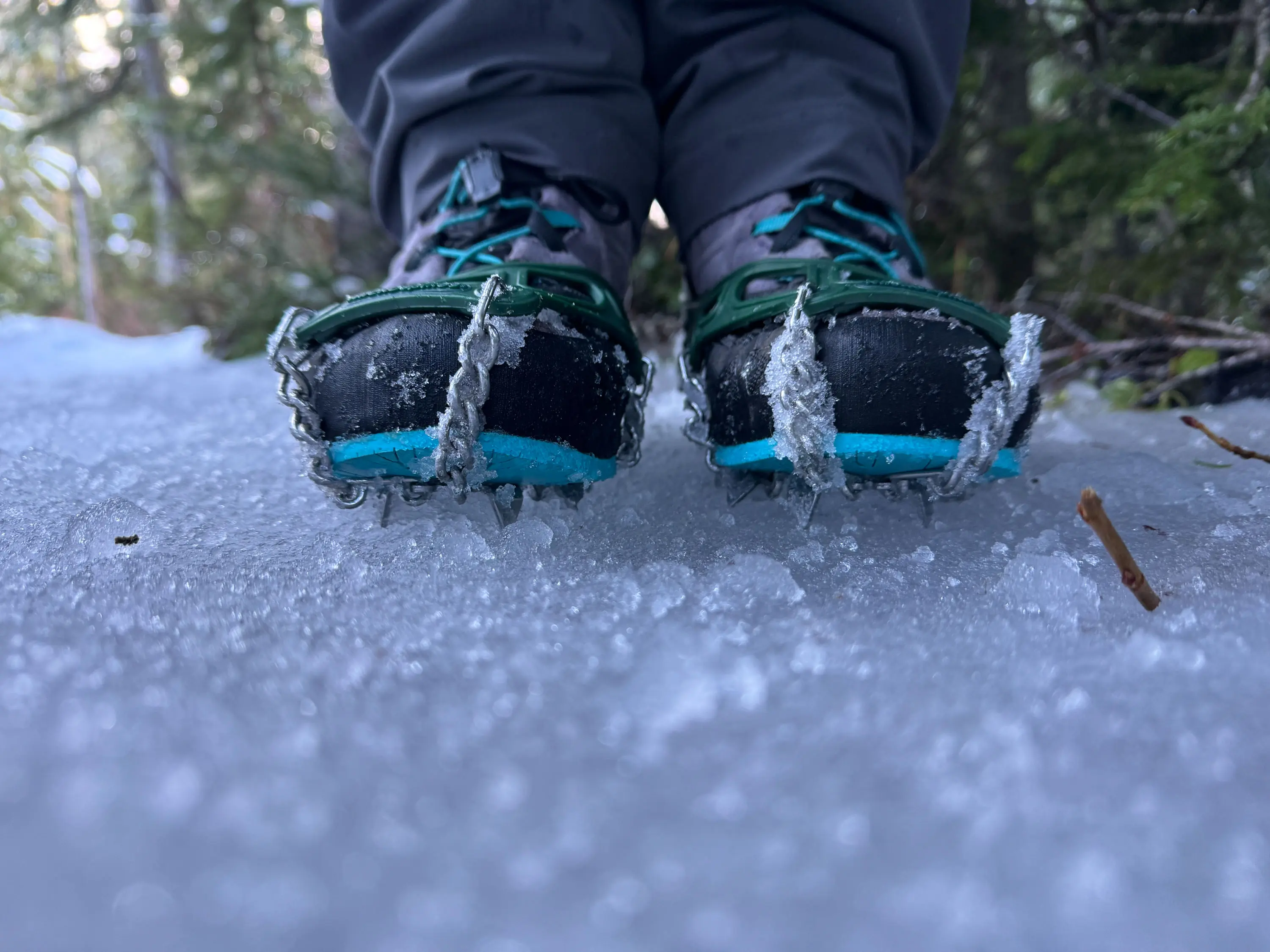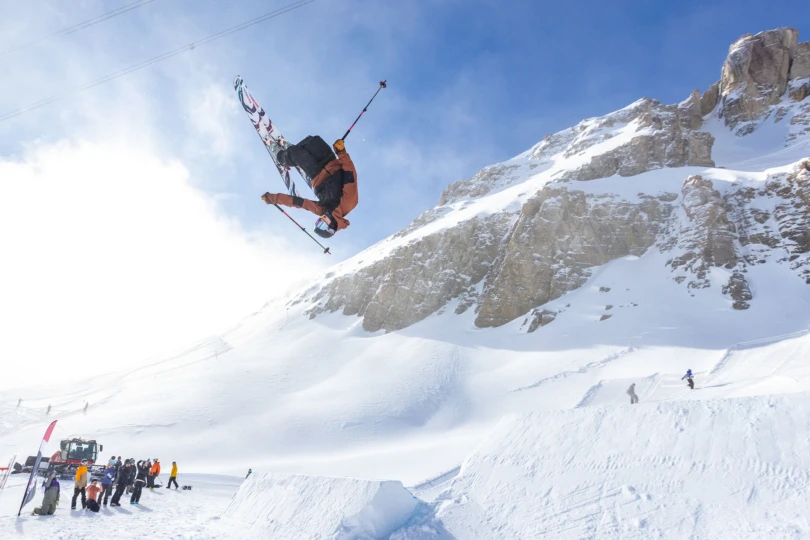It was a blue-sky day at Arapahoe Basin, high in the Rocky Mountains of Colorado. The sun glistened off the blindingly white snow as I carved my way down the mountain in a pair of 2024 K2 Mindbender 120 BOA ski boots fresh out of the box. The boots are part of the first wave of alpine ski boots to include the BOA Fit System. And they work both in the resort and the backcountry.
Ski boots with a BOA Fit System are nothing new to me. I’ve skied the Black Diamond Factor Alpine Touring Boot for nearly a decade, which has a BOA dial on the cuff to tighten the boot liner. There have also been several tour-specific boots to incorporate BOA on the shell, like the La Sportiva Vanguard.
However, the concept of a downhill boot with a BOA Dial on the toebox of the shell is an altogether new approach. And K2 isn’t the only brand pursuing this design. Salomon, Atomic, and Fischer are all similarly debuting downhill and hybrid boots with BOA fit systems this season. GearJunkie covered the technology when K2 first announced it was putting BOA in a downhill boot, the Recon.
The brand called it the “biggest advancement in 60 years” for ski boots.
The Mindbenders have Integrated TEC fittings (ITF) for tech bindings or DIN bindings. This combined with the BOA technology, which provides a better fit with micro-adjustability for better skiing, attracted me to these ski boots for the season.
I toured BOA headquarters in Denver to see what goes into these new boots before hitting the snow to test them out. I paired the K2 Mindbender 120 BOA boots with the Fritschi Tecton 13 Alpine Touring Bindings and a pair of Black Crows Navis Freebird skis for the test.
In short: The new K2 Mindbender 120 BOA boots offer versatility and comfort and don’t sacrifice performance. The BOA Fit System offers precise micro-adjustments for a better fit, which translates to more control and better performance on the slopes. The ITF makes these boots compatible with backcountry ski setups so you can take them touring. Freeride skiers looking for a one-boot option for all their skiing — in-bounds and out — can’t go wrong here.
- Category: Freeride, Powder, Touring, and Piste
- Weight: 1930g
- Sizes: 24.5, 25.5, 26.5, 27.5, 28.5, 29.5, 30.5
- Flex/Feel: 7/10
- BOA Fit System:
- H+i1 Dial:
- MultiFit Last:
- Powerlock Spyne:
- Precisionfit Pro Tour:
- Grip Walk Outsoles:
- Integrated Tech Fittings (ITF):
Pros
- Comfortable, micro-adjustable fit
- Durable build with grippy tread
- Better control with finer tuned BOA fit
Cons
- Would be great to have BOA throughout entire boot
- On the heavier side for backcountry touring
K2 Mindbender 120 BOA Review
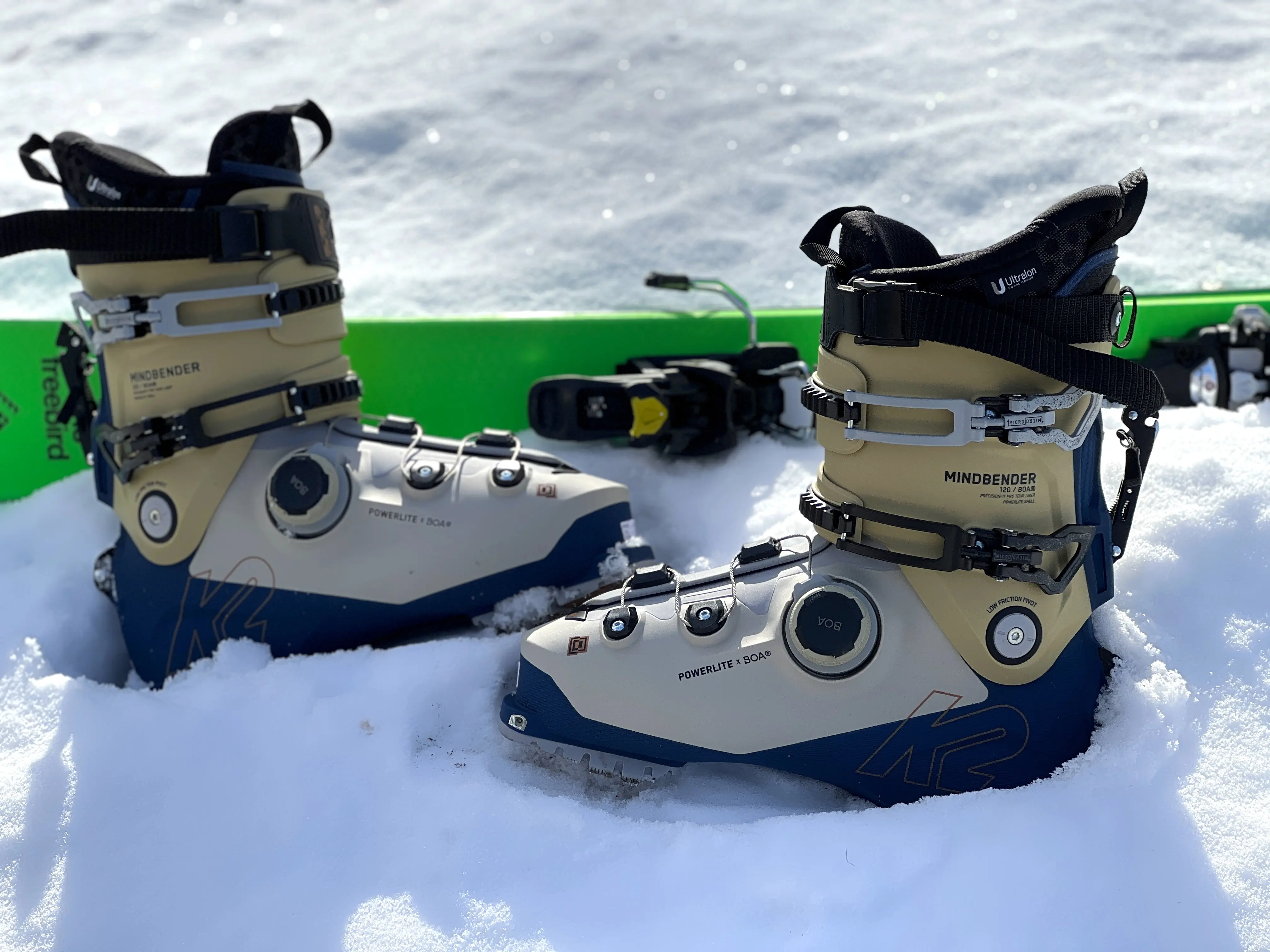
First Impressions
Right out of the box, the K2 Mindbender 120 BOA boots look clean and sharp. The color scheme of dark blue and off-white pair nicely.
The boots are designed with a heat-moldable Powerlite Shell and MultiFit Last. Offered in sizes from 97mm to 104mm, these boots fit a wide range of feet right out of the box and eliminate the need for both a “Low Volume” and “Mid Volume” fit. FastFit instep makes it easy to get the boots on and off. The Powerlock Spyne switches to “walk mode,” boasting a 50-degree range of motion.
Tech and Durability
The upper cuff of the boot still has a traditional buckle system. However, the toe buckles have been replaced with a large BOA Fit System. Visible wire laces zig-zag down the top. These are made of 19 strands of stainless steel, wrapped in an additional 90 strands. They tighten in 0.25 mm increments, and the tensile strength is greater than 559 pounds. So it should stand up to the pressures of downhill skiing.
The BOA dial also has a breakaway feature. Upon heavy impact, the dial ejects from the boot to avoid damage and remains tethered by its wire laces. Then you can easily pop the dial back in place. Thanks to the cable it’s attached to, you won’t lose it in the snow, either. And even if you do manage to break the BOA system, repair or replacement is easy with BOA’s lifetime guarantee.
The K2 Mindbender BOA Ski Boot’s Powerlock Spyne has an exposed spring and a little tag to help grip it. Compared to other AT boot systems such as the Dynafit Radical, which has the famed Hoji Lock System, or the Black Diamond Factor, the Powerlock Spyne looks exposed and fragile. Time will tell if they hold up. But they performed well during testing.




Backcountry Compatibility
At just over 4 pounds, these are a little heavy for longer backcountry excursions, but having Tech fittings in the toe and heel that are fully integrated into the shell injection is a big advantage. The Mindbender 120 BOA works with tech bindings and alpine DIN bindings, so you can go from the resort to the backcountry in a single day with the same boots.
The Grip Walk outsoles are beefy and will provide traction from parking lot pavement to bootpacking on a trail. K2 clearly designed these boots with the freeride skier in mind, looking for one boot to cover all types of skiing.
On-the-Snow Performance
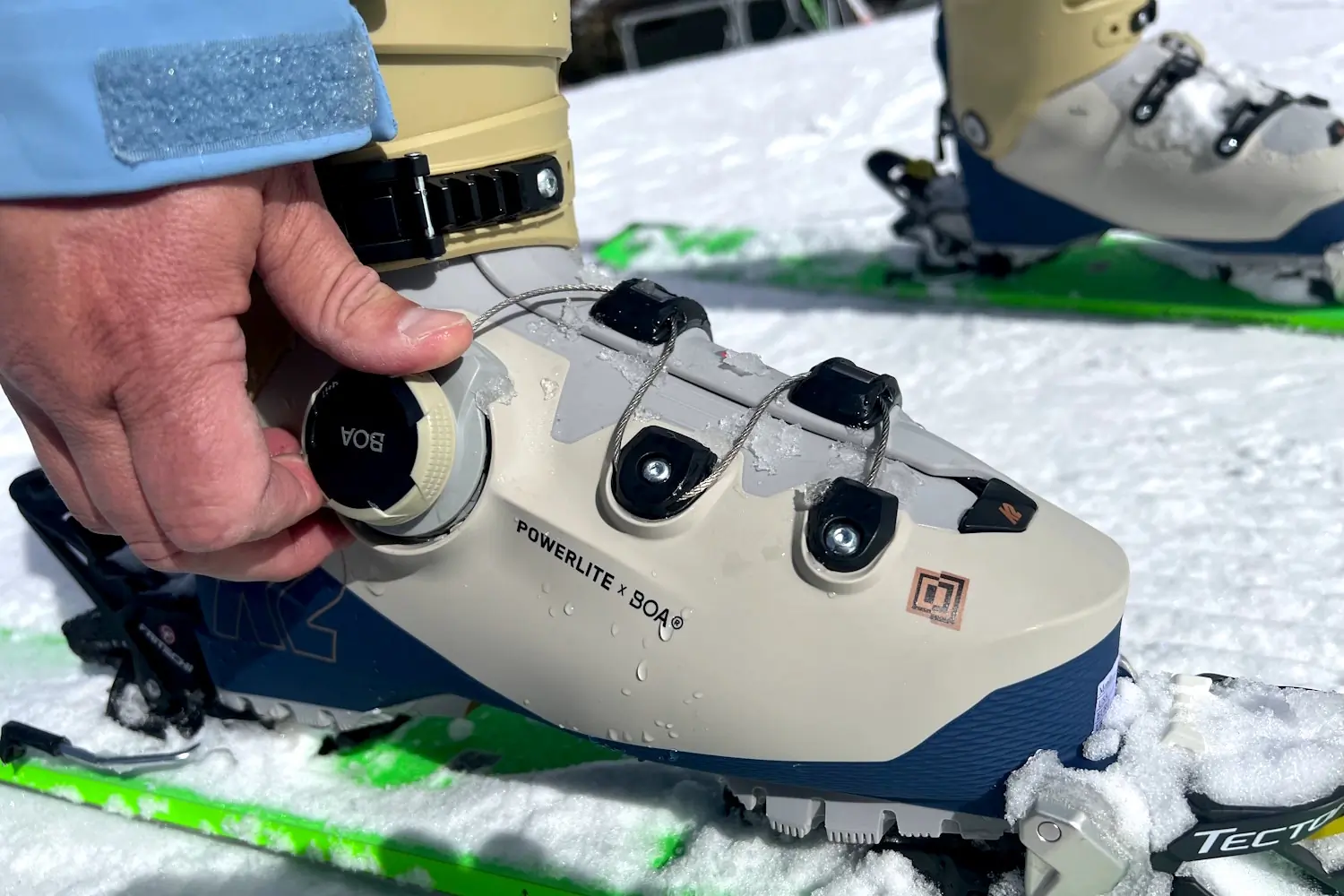



The Mindbender 120 micro-adjustability of the BOA Fit System is the real standout feature of these boots. And the simplicity of twisting the dial to tighten them evenly around your foot is really nice. It’s much easier than trying to ratchet down buckles and allows you to get a much more precise fit. If you tighten it too much, it’s easy to back off click by click.
Indeed, BOA invested more than 50,000 hours of design, development, and testing over 2 decades to create this new H+i1 platform. They collaborated with the world’s leading ski brands and snow athletes to ensure that the system would stand up to downhill pressures and abuse.
Historically, ski boots are very uncomfortable. But the BOA system wraps the boot around your foot as opposed to clamping buckles down on it. The result is a more comfortable ride and, theoretically, more control.
As I tested these boots and leaned into the turns, the Ultralon heat moldable foams with an asymmetric tongue and high-density power collar felt extremely comfortable. When walking uphill, the 50-degree range of motion and easy-hinging cuff pivot made walk mode a piece of cake with minimal resistance. A flex notch in the soft boot offered an increased range of motion while hiking.
Switching the Powerlock Spyne to downhill is easy, even when wearing gloves. The K2 Mindbender BOA ski boots have removable and interchangeable ISO 23223 alpine rockered soles. I have not removed these yet. But the boot’s shell and cuff can also be heat-molded for a true custom fit.
Room for Improvement?
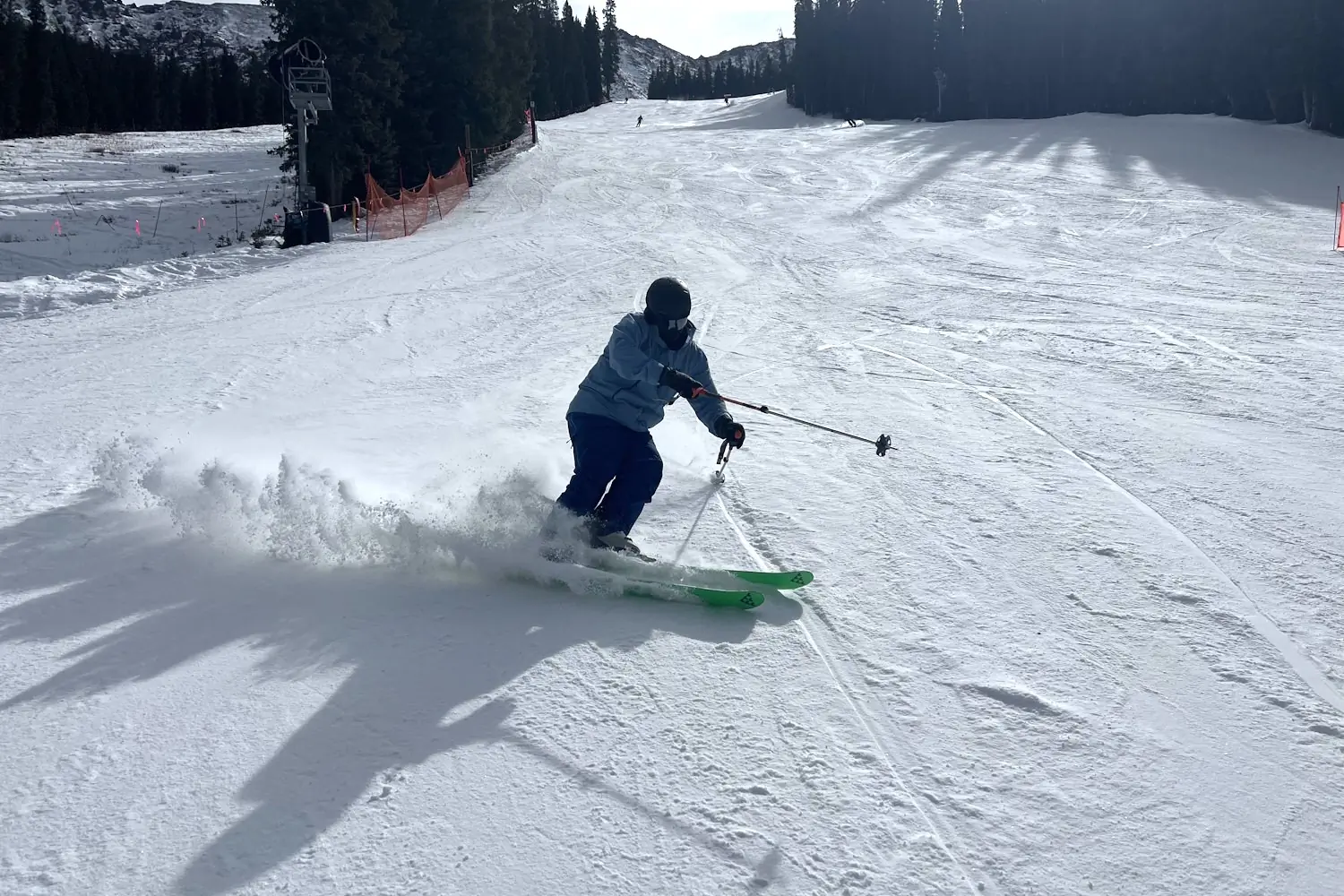



From my early season preliminary test at Arapahoe Basin, there wasn’t much I felt K2 needed to improve on the Mindbender BOA Boots. There weren’t any true cons about their design that jumped out at me. I found them to be durable and comfortable, they look cool, and they’re easy to use.
For a crossover resort/touring boot, they are pretty heavy. The Salomon Shift Pro weighs in at 1,690 g, and the Technica Cochise weighs 1,850 g. Even the Atomic Hawx Ultra XTD 120 BOA GW boots, which are new this season and likewise employ a BOA fit system, are 1,831 g.
At 1,930 g, the K2 Mindbender BOA boots are undeniably on the heavy end of the spectrum. For longer backcountry expeditions, I will likely opt for a lighter boot.
Furthermore, the Powerlock Spyne does look susceptible to damage if it took a serious hit, and the fabric strap on the upper cuff of the boot just dangles when I tighten it. There is a loop on the rear of the boot to hold the tag end of the strap, but I didn’t have enough of a tail to tuck it away.
Finally, in a perfect world, K2 would replace the buckles in the upper part of the Mindbender BOA ski boots’ shell with a second BOA fit system. That would improve the fit even more, and I believe that is K2’s intended next step. Soon, buckles might become a thing of the past for certain boot models. And the Mindbenders could be some of the first to go full BOA.
K2 Mindbender 120 BOA: Conclusion
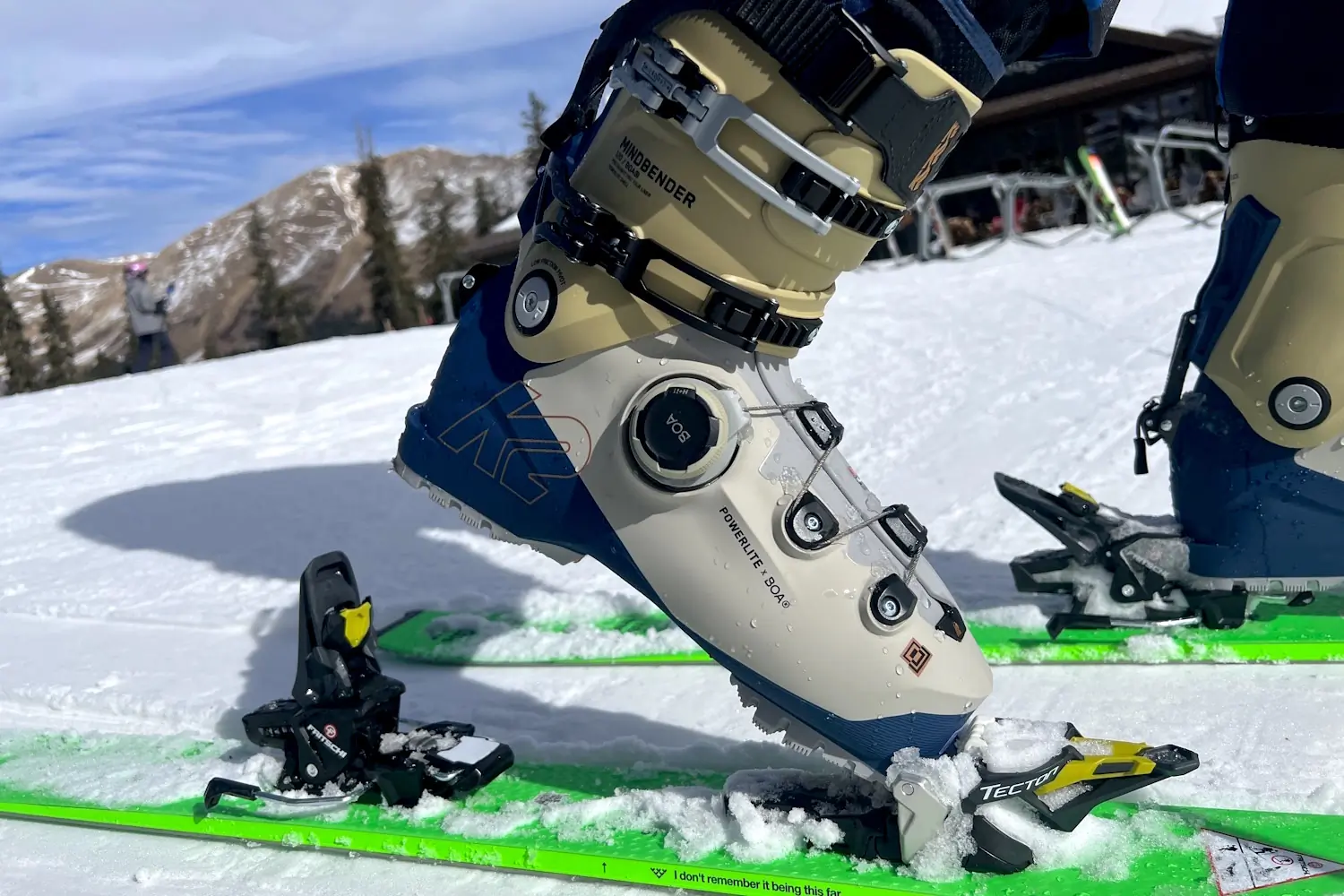



Over the years I have skied in a ton of different boots. Many of those were very uncomfortable and resulted in numb feet or black toenails. In my youth, I accepted that as the cost of skiing hard. However, the older I get the more I prioritize comfort over performance. Ski boot manufacturers are also getting better at combining the two.
That’s the beauty of the K2 Mindbender 120 BOA boots. You can have comfort while still getting peak performance thanks to the BOA Fit System. The new tech allows you to precisely dial the fit of the boots, the compression is evenly distributed around your feet, and they’re easy to use, durable, and transition easily from the resort to the skin track.
For a one-boot option for both backcountry and downhill skiing, the K2 Mindbender 120 BOA is a boot to seriously consider. There are also 95, 115, and 130 stiffness versions of this same boot. It’s available in men’s and women’s sizes and sells for $800. Check them out.
